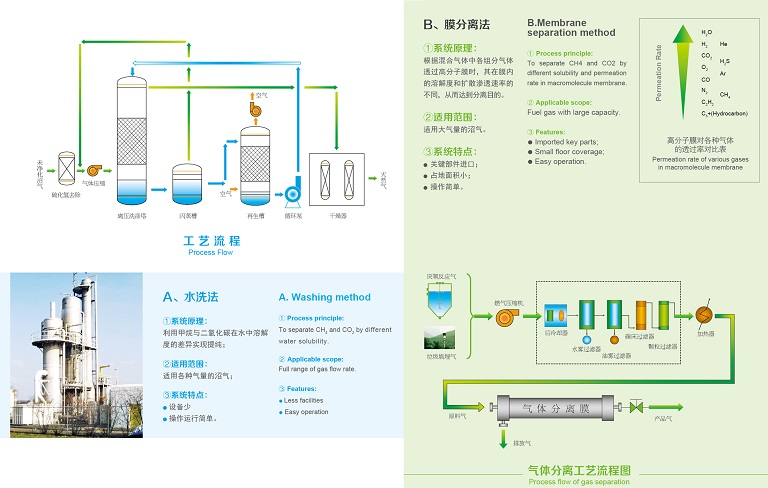生物脫硫,又稱生物脫硫(簡稱BDS),是一種在常溫常壓下利用需氧、厭氧菌除去石油含硫雜環化合物中結合硫的一種新技術。早在1948年美國就有了生物脫硫的專利,但一直沒有成功脫除烴類硫化物的實例,其主要原因是不能有效的控制細菌的作用。此后有幾個成功的"微生物脫硫"報道,但卻沒有多少應用價值,原因在于微生物盡管脫去了油中的硫,但同時也消耗了油中的許多炭而減少了油中的許多放熱量。科學工作者一直對其進行了深入的研究,直到1998年美國的InstituteofGasTechnology(IGT)的研究人員成功的分離了兩種特殊的菌株,這兩種菌株可以有選擇性的脫除二苯并噻吩中的硫,去除油品中雜環硫分子的工業化模型相繼產生,1992年在美國分別申請了兩項專利(5002888和5104801)。美國EnergyBioSystemsCorp(EBC)公司獲得了這兩種菌株的使用權,在此基礎上,該公司不僅成功地生產和再生了生物脫硫催化劑,并在降低催化劑生產成本的同時也延長了催化劑的使用壽命。此外該公司又分離得到了玫鴻球菌的細菌,該細菌能夠使C-S鍵斷裂,實現了脫硫過程中不損失油品烴類的目的。現在,EBC公司已成為世界上對生物脫硫技術研究廣泛的公司。此外,日本工業技術研究院生命工程工業技術研究所與石油產業活化中心聯合開發出了柴油脫硫的新菌種,此菌種可以同時脫除柴油中的二苯并噻吩和苯并噻吩中的硫,而這兩種硫化物中的硫是用其它方法難以脫除的。
Biological desulfurization, also known as biological desulfurization (BDS for short), is a new technology that uses aerobic and anaerobic bacteria to remove bound sulfur from petroleum sulfur-containing heterocyclic compounds at room temperature and pressure. As early as 1948, the United States had a patent for biological desulfurization, but there has been no successful example of removing hydrocarbon sulfides. The main reason is that it can not effectively control the role of bacteria. Since then, there have been several successful "microbial desulfurization" reports, but they have little application value. The reason is that although microorganisms remove the sulfur from the oil, they also consume a lot of carbon in the oil and reduce a lot of heat release in the oil. Scientists have been conducting in-depth research on it until 1998, when researchers of the Institute of GasTechnology (IGT) in the United States successfully isolated two special strains, which can selectively remove sulfur from dibenzothiophene, and industrial models for removing heterocyclic sulfur molecules in oil products have been produced. In 1992, two patents (5002888 and 5104801) were applied for in the United States respectively. Energybiosystemscorp (EBC) obtained the right to use these two strains. On this basis, the company not only successfully produced and regenerated the biological desulfurization catalyst, but also extended the service life of the catalyst while reducing the production cost of the catalyst. In addition, the company also isolated the bacteria of meihongcoccus, which can break the C-S bond and achieve the purpose of not losing oil hydrocarbons in the desulfurization process. Now, EBC has become a company with extensive research on biological desulfurization technology in the world. In addition, the Institute of life engineering industrial technology of the Japan Institute of industrial technology and the activation center of the petroleum industry jointly developed a new strain of diesel desulfurization. This strain can simultaneously remove dibenzothiophene and sulfur in benzothiophene in diesel oil, and the sulfur in these two sulfides is difficult to remove by other methods.

過程是以自然界產生的有氧細菌與有機硫化物發生氧化反應,選擇性氧化使C-S鍵斷裂,將硫原子氧化成硫酸鹽或亞硫酸鹽轉入水相,而DBT的骨架結構氧化成羥基聯苯留在油相,從而達到脫除硫化物的目的。BDS技術從出現至今已發展了幾十年,目前為止仍處于開發研究階段。由于BDS技術有許多優點,它可以與已有的HDS裝置有機組合,不僅可以大幅度地降低生產成本,而且由于有機硫產品的附加值較高,BDS比HDS在經濟上有更強的競爭力。同時BDS還可以與催化吸附脫硫組合,是實現對燃料油深度脫硫的有效方法。因此BDS技術具有廣闊的應用前景,預計在2010年左右將有工業化裝置出現。
The process is based on the oxidation reaction between aerobic bacteria produced in nature and organic sulfides. Selective oxidation breaks the C-S bond, oxidizes the sulfur atom into sulfate or sulfite and transfers it to the aqueous phase, while the skeleton structure of DBT oxidizes into hydroxybiphenyl and remains in the oil phase, so as to achieve the purpose of removing sulfides. BDS technology has been developed for decades since its emergence, and is still in the development and research stage so far. Because BDS technology has many advantages, it can be organically combined with existing HDS devices, which can not only greatly reduce the production cost, but also have stronger economic competitiveness than HDS due to the high added value of organic sulfur products. At the same time, BDS can also be combined with catalytic adsorption desulfurization, which is an effective method to achieve deep desulfurization of fuel oil. Therefore, BDS technology has broad application prospects, and it is expected that industrialized devices will appear around 2010.
The above is the detailed introduction of biological desulfurization for you. I hope it can help you. If you have any questions, please contact us. We will provide services for you with a professional attitude http://m.usacato.cn
